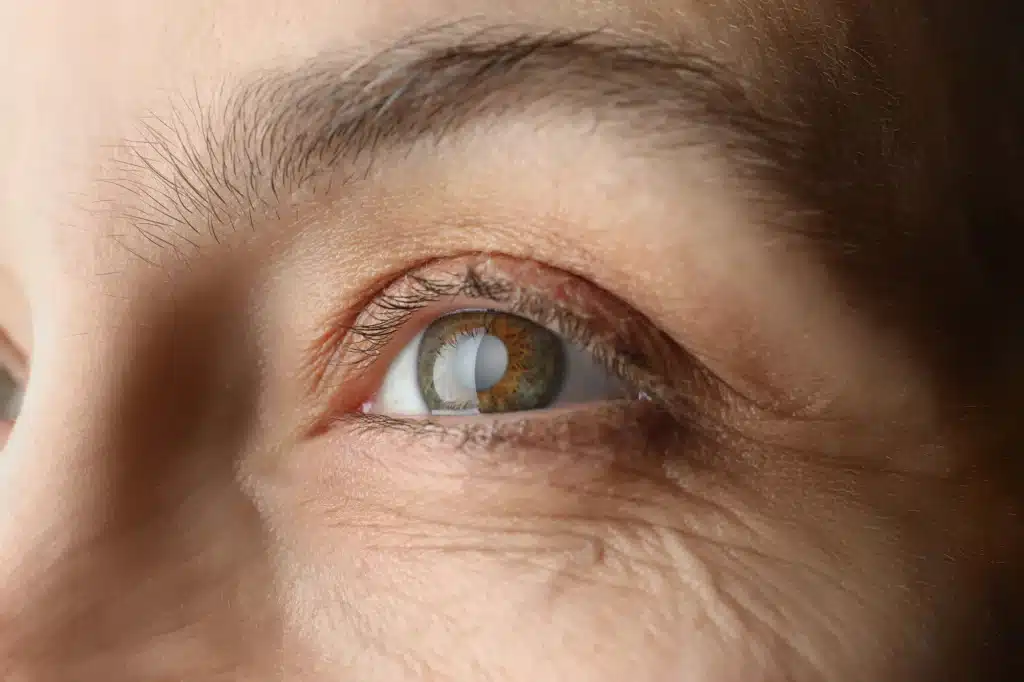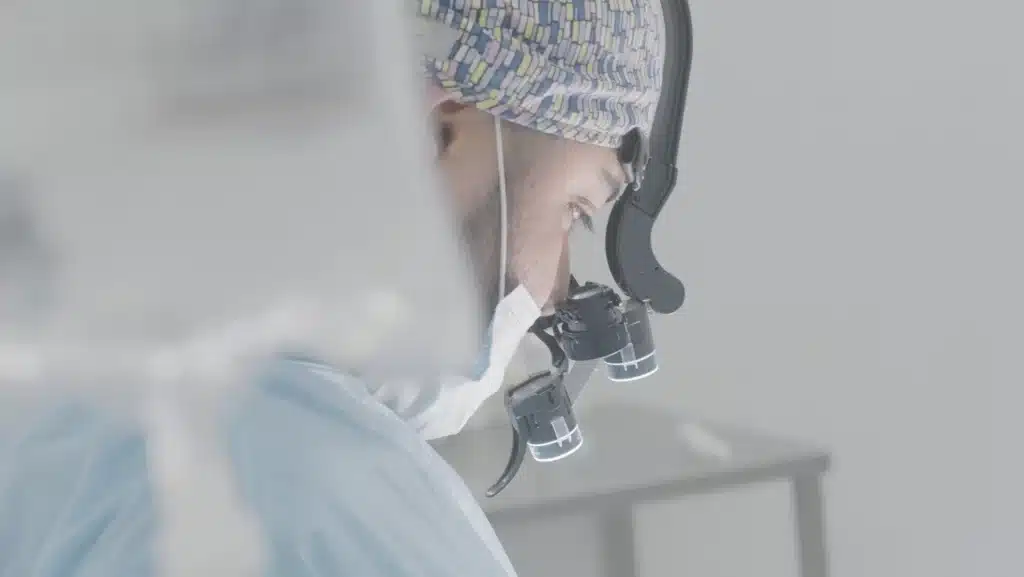Medically Reviewed by: Mark L. Mayo, M.D.
What To Do About Double Vision After Cataract Surgery
Cataract surgery is a popular, low-risk procedure that restores your clear vision by removing clouded lenses from the eyes. If you’ve been considering cataract surgery, you likely have some questions about what to expect. What should I expect my vision to be like after cataract surgery? What happens if only one eye needs cataract surgery? Will I have to worry about double vision?
Some patients may experience double vision after cataract surgery, also known as diplopia. While this can be concerning, it’s important to understand that it’s not uncommon and can often be managed effectively with the right care. The ophthalmologists at Eye Center of Texas are here to discuss the causes of double vision after cataract surgery, how long it may last, and what steps you can take to address it.
What causes double vision after cataract surgery?
If you’ve undergone eye surgery and thought to yourself, my vision is getting worse, or you have sudden blurry vision in both eyes, your first instinct may be to panic. Rest assured that, while frightening, seeing double after eye surgery is a common occurrence. So, why does this happen?
Double vision occurs when the eyes are unable to align properly, causing two images of the same object to appear. This can be disorienting and make it difficult to perform daily tasks. If you’re seeing double after cataract surgery, this may be for a few reasons:
- Refractive errors: Sometimes, double vision can happen if your eyes have different levels of refractive power, or the eye’s ability to bend light rays. This can occur if one eye has undergone cataract surgery while the other hasn’t, leading to a mismatch in vision.
- Muscle imbalance: The muscles that control eye movement may be affected during cataract surgery which can cause imbalances and result in double vision.
- Astigmatism: Cataract surgery can sometimes induce astigmatism, a condition where the cornea is irregularly shaped, causing light to focus unevenly on the retina and resulting in blurred or double vision.
- Intraocular Lens (IOL) positioning: Improper positioning of the intraocular lens, which replaces the natural lens during surgery, can cause visual disturbances including double vision.
Can cataract lenses cause double vision?
Because cataract surgery can change your depth perception and how your eyes work together, the type of lens you opt for can have an effect on your vision post-op. IOLs come in three forms, representing three cataract surgery lens options:
- Monofocal lenses, which are designed to help with vision for one distance
- Multifocal lenses, which are designed to improve vision at different distances (near and far)
- Toric lenses, which are designed to help correct astigmatism
While recovery and vision expectations will vary based on what type of lens you receive, it is normal for most patients to experience a temporary blurriness after getting cataract surgery in one or both eyes as their eyes recover and adjust to their new lenses.
How long does double vision last after cataract surgery?
The duration of double vision after cataract surgery varies from person to person. In most cases, experiencing diplopia after cataract surgery can last anywhere from a few days to a few weeks, depending on how long it takes your eyes to heal. However, in some cases, double vision after cataract surgery may persist for a longer period of time.
If your double vision persists or worsens, it’s essential to consult your ophthalmologist for further evaluation. Keep in mind that you shouldn’t expect to have fully stabilized vision for at least a few weeks (3-6 weeks, typically) after receiving cataract surgery, and that patience is key!
How do you get rid of double vision after cataract surgery?
If you’re experiencing double vision after cataract surgery, here are a few tricks you can try out to limit the discomfort:
- Picking up some reading glasses
- Wearing an eye patch
- Resting your eyes and limiting screen time
Unfortunately for some, their persistent double vision may require medical intervention. The treatment for diplopia after cataract surgery that will work for you will depend on the underlying cause of your double vision. When you schedule a follow-up with your ophthalmologist, here are some common approaches to addressing double vision that they may suggest:
- Prism glasses: In some cases, prism glasses may be prescribed to help realign the images perceived by each eye, reducing the effects of double vision. These specialized glasses contain prisms that manipulate the light entering the eyes to align the images so you won’t be seeing double. This is a good option to begin with as your eyes heal from cataracts treatment.
- Adjusting your lens implants: If the double vision is due to improper positioning or power of the IOL, your surgeon may recommend additional surgical intervention to reposition or replace the lens. This can help ensure proper alignment of the eyes and reduce double vision.
- Examining the eyes for muscle disorders: If muscle disorders are determined to be causing your diplopia, conservative vision therapies such as prisms and occlusion can be treatment options. If these are not successful, eye muscle surgery may be recommended.
Experiencing double vision after cataract surgery? Eye Center of Texas is here to help.
Although it is a common occurrence, experiencing blurry vision or double vision after cataract surgery can still be concerning, especially if it is persistent. With proper diagnosis and care from a trustworthy ophthalmologist in Houston, these vision disturbances are generally nothing to worry about.
If you are interested in treating your cataracts, it’s important to find the best cataract surgeon in Houston, TX to perform your surgery. Eye Center of Texas can offer patients the best cataract surgery Houston has to offer due to our incredible cataract surgeons who have performed over 80,000 successful cataract surgeries.
“Dr. Wade was extremely professional in his approach and my cataract surgery was quick and painless! I will definitely be returning to this location to do my other eye!”
Judith B. | Satisfied Patient
To learn more about cataract surgery and its benefits, call 713-797-1010 or request an appointment today. At Eye Center of Texas, your vision is in good hands.
More Helpful Articles by Eye Center of Texas:
- Why Patients Say We Are the Best Ophthalmologists in Texas
- 7 Things To Do When Preparing for LASIK Surgery
- What is the Latest Treatment for Dry Macular?
- Why Is There a Bump on My Eyelid?
- What is the Average Cost of LASIK in Texas?
Related Articles
Financing Options Available
Apply today to find a financing option that meets your needs.
Our Locations
Houston/Bellaire
6565 W. Loop S., Suite 650Bellaire, TX 77401
Medical Office:
713-797-1010
Medical Fax:
713-357-7276
LASIK/Near Vision:
Office: 713-395-1515
Fax: 713-357-7278
Pasadena
4415 Crenshaw RoadPasadena, TX 77504
Medical Office:
281-977-8800
Medical Fax:
281-977-8877
Sugar Land
15400 S.W. Freeway, Suite 301Sugar Land, TX 77478
Medical Office:
281-277-1010
Medical Fax:
281-277-4504
Clear Lake
455 E. Medical Center Blvd., Suite 110Webster, TX 77598
Medical Office:
281-332-1397
Medical Fax:
281-282-9152
Katy
Greenhouse Medical Plaza2051 Greenhouse Road, Suite 110
Houston, TX 77084
Medical Office:
713-797-1010
Medical Fax:
713-357-7276
The Woodlands/Conroe
100 Medical Center Blvd., Suite 118Conroe, TX 77304
Medical Office:
713-797-1010
Medical Fax:
936-647-1620


